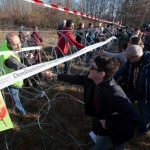ZAGREB, March 13, 2019 – European governments are complicit in “the systematic, unlawful and frequently violent pushbacks and collective expulsions of thousands of asylum seekers” from Croatia to squalid and unsafe refugee camps in Bosnia and Herzegovina, the human rights watchdog Amnesty International (AI) said in a report published on Wednesday.
“Currently around 5,500 women, men and children are trapped in two small Bosnian towns near the Croatian border, Bihać and Velika Kladuša, living in defunct former factories without basic amenities. Bosnia and Herzegovina cannot offer them adequate protection or living conditions and the improvised camps are unhygienic, lacking hot water, medical care and sufficient food,” the London-based organisation said in the report entitled “Pushed to the edge: Violence and abuse against refugees and migrants along Balkan Route.”
The report details “how, by prioritizing border control over compliance with international law, European governments are not just turning a blind eye to vicious assaults by the Croatian police, but also funding their activities. In so doing, they are fuelling a growing humanitarian crisis on the edge of the European Union.”
“To understand where European government’s priorities lie, one only needs to follow the money. Their financial contribution towards humanitarian assistance is dwarfed by the funds they provide for border security which includes equipping Croatian border police and even paying their salaries,” said Massimo Moratti, Director of Research for Amnesty International’s Europe Office.
“Meanwhile people fleeing war and persecution are beaten and robbed by the Croatian police and forcibly pushed back to legal limbo, left at the mercy of a failing asylum system in Bosnia and Herzegovina,” AI said, noting that migrants caught in Italy and Slovenia are expelled back to Bosnia and Herzegovina via Croatia.
Many migrants described how they were beaten, had their documents destroyed and possessions stolen in what appears to be a systematic and deliberate policy by Croatian authorities designed to deter future attempts to enter the country.
Bureaucratic obstacles, inadequate legal assistance and limited administrative capacity mean that potential asylum-seekers are unlikely to get their asylum claims processed in Bosnia and Herzegovina. Most attempt to proceed to other European countries, and the journey is not easy.
“Having previously entered the EU through Greece and Bulgaria and having been abjectly failed by the asylum system there, people exit the EU to continue the journey along the Balkans. In order to reach Slovenia or Italy, where the EU Schengen free movement regime begins, they have to navigate Croatia’s dense forests, fast moving rivers and, in some places, live minefields,” the report says.
In the first ten months of 2018, at least 12 people drowned in the Western Balkans, most of them trying to cross the border from Croatia to Slovenia, and dozens more died in other ways, AI said.
“As the allegations of violent pushbacks on the borders have mounted, Croatian authorities have increasingly discouraged public scrutiny of country’s migration practices. Attempts by Croatian public institutions to oversee migration practices at the border have been blocked and organizations working on migrant and refugee rights have been targeted by the authorities,” the organisation said.
“NGO volunteers have been harassed, held for hours by police without formal charges and threatened with criminal prosecution. The Ministry of Interior has even accused some NGOs of assisting people to enter Croatia irregularly,” it added.
“In spite of these appalling practices at the border, the European Union has continued to allocate significant funds to assist Croatia in its border security infrastructure. The EU has also wilfully ignored the failures of the European asylum system that make these journeys necessary,” the report said.
“European leaders can no longer wash their hands of responsibility for the continued collective expulsions and violent pushbacks along the Balkan route that are the result of their determination to fortify EU borders, no matter what the human cost is,” Moratti concluded.
More news about the migrant crisis can be found in the Politics section.








